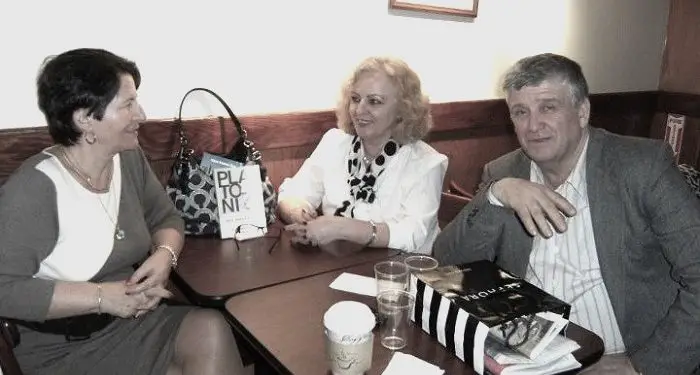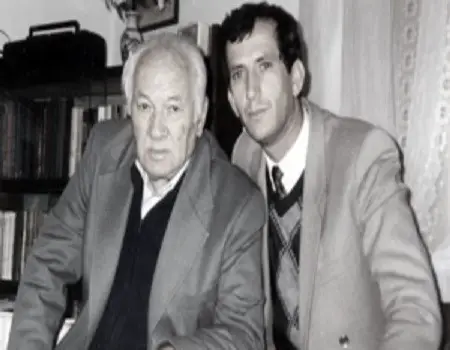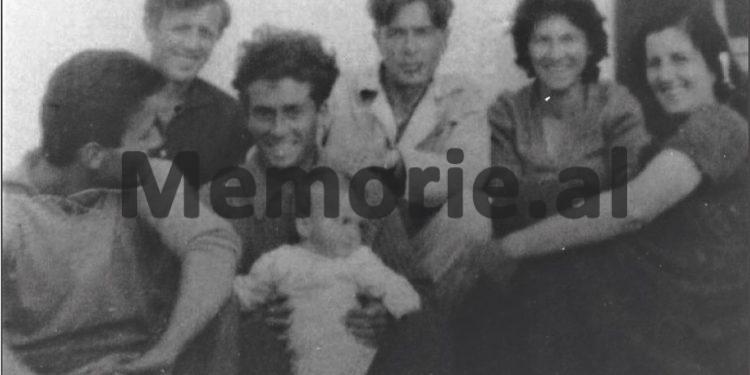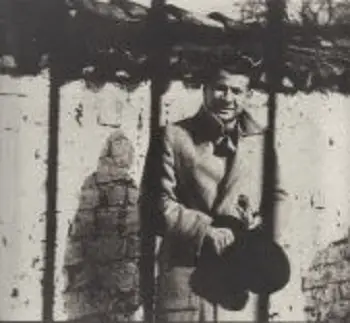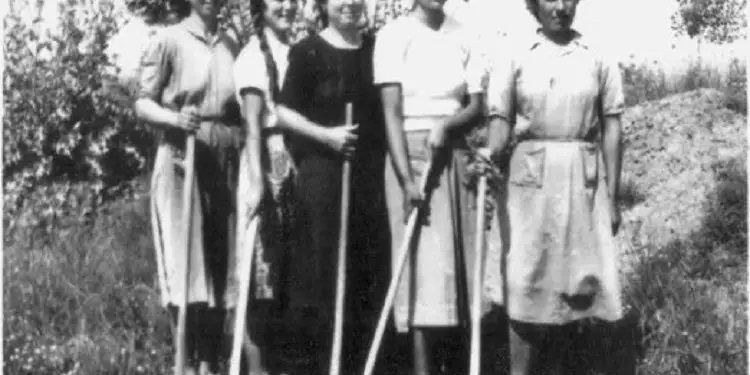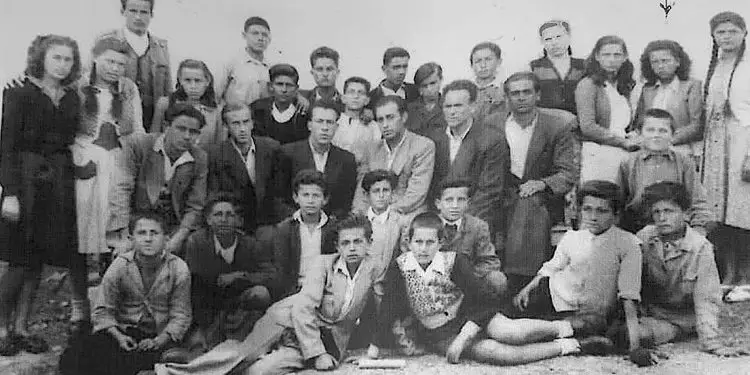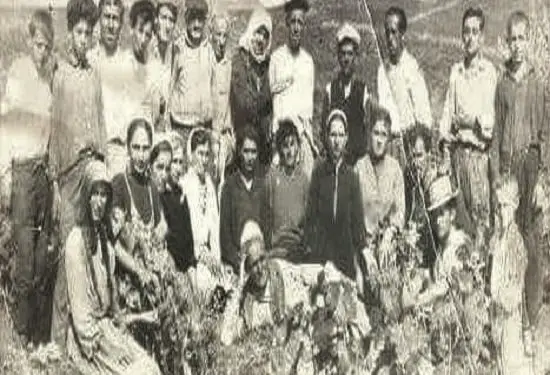By Kozeta Zylo
Memorie.al / The writer Bajame Hoxha, together with her family, was interned her entire life in Savër of Lushnja. Mrs. Hoxha worked during this period in heavy labor, bearing the burden of persecution and denial of every basic right. She now lives with her husband and three children in Brussels, where, due to the severe 31-year sentence and subsequent consequences, she has gained the right to remain through political status. She has published a total of 16 books, and her work has been valued by serious critics. Mrs. Hoxha visited New York for a work trip, where I met her and conducted the following interview:
Mrs. Hoxha, could you tell us something about your childhood and when you started to feel the persecution and violence that your family faced? What was the cause of your internment?
Yes… I was still under 11 years old when our house was surrounded at night by soldiers and police hidden behind walls and fences for a month. My father, Zaim Çeliku, was only 45 years old, knowledgeable of seven foreign languages, when one autumn night he disappeared and never returned home after work.
My father’s life and activity were in Gjirokastra, where we had a good restaurant at the Qafa e Pazarit and a three-story house with a large yard, close to Qafa e Pazarit. My father was a well-known merchant and philanthropist, recognized from the South to the North. There isn’t anyone who knew my father that hasn’t received a gift or a good deed from him.
And as a beautiful but very painful memory, an old man comes to mind now: We were at a wedding at my uncle’s after many years of internment. While walking not far from my uncle’s house with my husband, and in front of us were my sister Shpresa and her husband Gëzimi (both married during internment, to internees), I see an old man stop them and address my sister gently: “Excuse me, honored lady, are you the daughter of Zaim Çeliku?”
“Yes,” my sister replied, and a wave of sudden thoughts burned her wounded spirit, as she had not been six years old when she lost her father. Meanwhile, the unknown man had knelt and kissed my sister’s feet, and placing his hand on his heart, he left and disappeared among the crowd, leaving behind tears and that unforgettable memory in our hearts. I do not know, I do not know why they destroyed us…?!
It was a beautiful afternoon in October 1959 when unexpectedly we found ourselves surrounded by dozens of soldiers and police. I had just returned from school and was doing my homework in the yard with a friend of mine, when we froze in place due to the substantial presence of armed military personnel, who rushed inside.
At six o’clock in the morning, we arrived at the camp in Savër, where the internees had just finished the roll call and were preparing to go to forced labor. They unloaded the few belongings we were allowed to bring and left us waiting in the center of the camp. After two hours, they put us in the women’s barracks, giving us as living space near the door, two meters for six people, a mother with five orphaned children.
The barracks were long with large windows, but fortunately, they had wooden flooring since we didn’t have beds. In this barrack, we found 40-50 families, women and children, but also men from these families, who went far away to sleep in the men’s barracks, where they awaited beds stacked two or three high, with a floor damp all the way to the middle.
In this barrack, many well-known families had passed through and later established themselves in apartments filled with dampness, for example, four or even five families in one room. There, in the barracks, we met Agim Prodan’s father and his wonderful mother, Anko Bylos, who was very elderly and cared for us during the day.
She loved us greatly and would tell our brother: “Luan’s mother” because she shared the name of her son, Luan, who had escaped with his two brothers for political reasons, leaving his elderly mother behind, and the heartless regime had interned her.
There we also found the esteemed Afërdita Skrami, a former teacher, the sister of actress Liza Laska, whom her family had eternally denied. She was a very beautiful and extremely intelligent young woman. Afërdita Skrami was proficient in the Albanian language, ancient Greek, and Italian. From this noble woman, who was condemned by time because she refused to become the mistress of the authorities, we benefited greatly.
She wrote poetry, spoke culturedly, and had such a strong memory that it left you speechless. She had no family and was never discouraged; we were her family! We all loved that noble woman, and among all the internees, her door was always open. My mother always left her portion of food, equal to ours. She had studied, and she passed her knowledge onto us.
My brother Luan and sister Shpresa, as young as they were, would quarrel about who would sleep first with Drita Skrami because our beds were pushed together. I don’t know what happened to her after democracy; she was a part of us and deserved respect. We, all the internees, were her family. She had an iron character and never became a tool for anyone. She was a faithful woman who carried thousands of beliefs within herself.
I don’t know why in this interview I focused on this noble figure, perhaps because she had a powerful, positive impact on our horrifically devastated lives.
When did you begin to write your first poem, and what inspired you?
I wrote my first poem on the way to internment; I was inspired by violence, struck by injustice, the sudden destruction of a family. Are children arrested? We were in the car, as dawn was breaking, and we were traveling with the police to the camp in Savër. The autumn morning was very beautiful, but the police stood over us and spoiled the lovely dawn.
I took out of the bag, which I had kept in my hand since the moment of internment, my notebook and pencil and wrote: “My word today has cut lips/ Look, the police stands over my lips/ The voice fades and blinks/ Beautiful dawn turns into twilight/ One by one like harvest grains/ I will gather the letters now/ And with strength like a poet/ I will write: for you, freedom.” (Democracy)
This poem was lost along with two hundred other poems at the Institute of Political Persecution, where I had sent them for publication, and which were never published. Here, in this poem, at this beautiful dawn, with this barbaric start, with this beginning of imprisonment and internment, my poetry began and did not stop, but so did my prose.
At the age of nineteen, I finished my first novel, which never saw the light of publication; during a raid, they erased my writings, but I kept within me many poems that I later published, except for the first 200 poems, which hurt me the most; I lost them in democracy, being the leading cause of the director of the Institute and his staff.
Your life has been between “Hell and Paradise,” while the necrology of evil remains unburied; your persecuted class, can it remove the evil that remains like a thorn in the foot, in Albanian politics?
Yes, indeed, our life for 31 years has been an endless hell of torture, humiliation, forced labor, the great class struggle, discrimination before the people, that I supposedly sought Anglo-Americans, because I wrote, because I read books, because I commented and reviewed well-known works, because I worked and was diligent in heavy work without ever asking for alms or privileges from them, because I stood firm and unyielding before their psychological pressures and threats.
This terrified them more and more. From the age of 16 and beyond, they brought me before the people as a bad example, claiming I wanted to overthrow the people’s power and that I sabotaged communism. I was diligent in work and worked alongside men, in the same group and team. I worked with my friends, wonderful boys and men, with whom we exchanged ideas during heavy labor, discussing world music and literature to lighten the workload.
I can never forget Koço Plasoti, this handsome, peace-loving man of culture, who sang to us all day, for he had been with the choir from Korça. Also, Stefan Tasho, a gem of a boy who was wise and intellectually elevated; you loved to hear his kind words, and Gëzim Baruti, a boy with an intelligent and correct demeanor, agile as well, who played the guitar and we sang together in the evenings to forget a little the hard work and the contempt we faced from behind.
Gjon Markagjoni, Jonuz Musai, boys that will never be forgotten, as well as Ahmet Kolgjini, a scholar and creator with a strong character. Bajram Hoxha, a hardworking, wise man with high virtues, and later the children, Ganiu, Azizja, Myrvetja, Servetja, and Byslimi, who had strong characters and never bowed down.
The Kuqeshi brothers, Thanasi, Petraq, Polikron, Sofokliu, Mondi, and their sister Evgjenia, exemplary siblings who worked the same as they plowed with the tractor. Sokol and Simon Miraka, well-educated and intellectually prepared young men. Musa Sina, a noble family man of integrity, with a fine sense of humor, and his wife Myrvetja were models of resilience.
Elez Hoxha, a noble son and a model of resistance, Nikoll and Drane Mernaçi, a family with high traditions and loyalty. Bekim Herri, this gentleman who enjoyed the trust of everyone, often came from the Gradishta camp with permissions to give us special joy; he played the accordion and under its sounds, we forgot the great evil.
The Kokali brothers, Kiço, Vasili, Llambi, an exemplary family, raised wonderful children within the camp. The Çapo brothers, Idai, Eqeremi, Fadili, and Lefteri, these boys with strong characters. The Prengjoni brothers, the pride of nobility, such as Hyseni, Kadriu, Zeqiti, Alushi, and their two sisters. The Laholli brothers, Luani, Ahmeti, and Ferdinandi, with their heroic mother, Zengjine, were the balm for the wounds of our society, very positive boys.
The Çeliku family, Luani with his mother Hatijhe, and his four sisters were models of resilience. The Cafi family, Taze and Idriz Cafi, a mother and son, were examples of resistance. Lazer Radi and his family, exemplary resilience. The family of Dine Dinaj, Tomori, Sazani, Dine, and their sisters were examples of resistance. Liri and Genc Bajraktari, sister and brother, were models of resilience. Sherif Nela, a family of integrity with exemplary children.
Kristina Gjoni, Irena Dukagjini, Tefta Çapa, Esma Biçaku, Valbona Miraka, Luftani Agolli, who would only smile, and their wise words; likewise, Lajde, Evanthie, and Sofie Kokali, a family that was respected at all times. The Herri Sisters, Dezdemona, Shpresa, Bardhylja, my friend and peer, Fjorentina, who delighted you with her wise words and lovely voice when she sang.
The Kolgjini Sisters: Sania, Feridja, Fatimja, and Shpresa were models of resilience. The Musai family, Jonuzi, Shpresa, Hysnia, and Dervishi were a distinguished family with rare qualities, and many others. In this interview, I mentioned many names of friends with whom I have worked and lived over the years, for 31 years.
I apologize to all those whom I did not have the opportunity and time to mention here. I assure my good friends that none of you, even though you are not in this interview, will be excluded from the upcoming documentary book titled “The Wails of Spring” that will be released soon.
I want to express that the half-century suffering was ours, for all of us, and not of the so-called old or new Albanian politicians. We must love and honor one another, just as we did in those ominous camps. I would say that it is difficult to uproot and forget from our hearts that terrible persecution, that childhood tainted by contempt from behind, that beautiful youth lost in the camps of communist terror.
So, we left behind the hell of Enver Hoxha, and now I live in peace, in complete freedom. I feel that I reached paradise late, but I reached it. This is how I would call it, and this would be my answer. Paradise for me is freedom; it is what I am living! It is Brussels.
While the necrology of evil remains truly unburied, I would say it has not died yet; it must die once, and all the rites and obligations that are owed to it should be performed, and then buried with honors. After the burial, we should have a memorial day, so that the media can be engaged and know the plan of work on that date. Shouldn’t there be a date set to remember these victims and hold commemorations? Without us, without our existence, there would be no beginning and continuation of democracy.
Do you think that the literature of the persecuted writers continues to feel the indifference of genuine critics, or worse, is it still threatened as it was during the dictatorship?
I often notice with pain that there are still strong ties to the dictatorship, and its clans unfortunately continue. Those who were coddled by the dictatorship again seek the same privileges and trophies; “Those who are accustomed do not rest.” But there are truly distinguished poets and writers, progressives, who know how to appreciate our class, and there are many of them.
You have been neighbors in internment with Dr. Lazer Radi, a distinguished scholar of the Nation, a close friend of Migjeni, sentenced to 50 years. Why do critics and politicians continue to deny him, and what is even more shocking, they deny him and hide his photo with Migjeni, while remembering Migjeni with some seminar or book? What is your opinion as a writer?
It’s unfortunate! Scholars like Dr. Lazer Radi are rare in life. He was a friend of Migjeni and of mine, of all of us; that’s undeniable, and his book “A Summer with Migjeni” is a masterpiece for Albanian literature, and we should all be proud of it. This book was interned along with the author for 50 years and suffered in drawers, all that persecution.
I have emphasized in other articles I’ve written that Dr. Lazer Radi remains a hero among the oppressed, a myth, a positive man who gave so much of himself, who brought light in those dark years when we needed it desperately.
During the publication of your books, have you had to defend yourself against the meanness of some old critics, since literature and art need drainage, necessary cleaning, and reevaluation?
No, on the contrary, I have felt well received by many personalities and critics of Albanian literature, even though I have not received any awards, except for some song texts where I earned a second prize, a certificate of honor, and a flag. But surprisingly, when the Socialist Party was in power, my books were accepted by the Ministry of Education for schools. This means that I was well received by the Albanian criticism, and it is an appreciation that was made to me by known people and figures.
As for poetry awards, this is known; these are reserved and kept only for themselves and within their clan, all the juries. But I am proud of one thing: I have verses filled with feelings and the grandeur of eras! I have a beautiful and strong phrase!
Even though I was part of the “overturned class,” I know the rules well, since they closed the doors of schools to us, but they could never close the doors of knowledge and schools within our homes, as it was in the house of Dr. Lazer Radi, a strong school. Now and always, I am tolerant; I am for peace and love all Albanians, whether they are left or right.
Something about your personal life in internment and your family’s life in Belgium?
Where should I begin? A flood of bitter memories comes back to me and strikes my soul, just like before in those roll calls, in those humiliations, in those muds, in those fields and canals we opened and left with the tears of our childhood, with the tears of our youth, and further, with the tears of a young mother who had nothing to feed her child.
We lacked everything. Above all, we lacked Freedom, the drop of milk for the newborn in that inferno of internment.
My personal life went lost like many other lives, through the brutal camps of communism. Nevertheless, now I have reached out and want to seize the time I have left with optimism. And I am trying with all my strength to forget that painful tear that remained far away in that cursed land.
And what can you tell us about Belgium?
Belgium is my second motherland. I love and cherish it because it welcomed me as its daughter. In Belgium, I found the tranquility and lost freedom, and true democracy, since my country for 50 years closed all doors to me and denied me as a person. But this state opened all its doors to me with love, giving me the rightful place and political status.
I am very grateful to this generous country, which has such great democracy, where it also opened the doors of the school, where I learned French for four years, and now I am also involved in translating poetry and prose. Thank you, Belgium! (Merci, c’est très gentil de votre part).
Well then, I have nothing left, Mrs. Hoxha, but to thank you for this rich and beautiful interview. Once again, thank you, and we wish you continued success!
Thank you, Ms. Kozeta, for this interest full of kindness and culture that you always show to our layer. /Memorie.al




